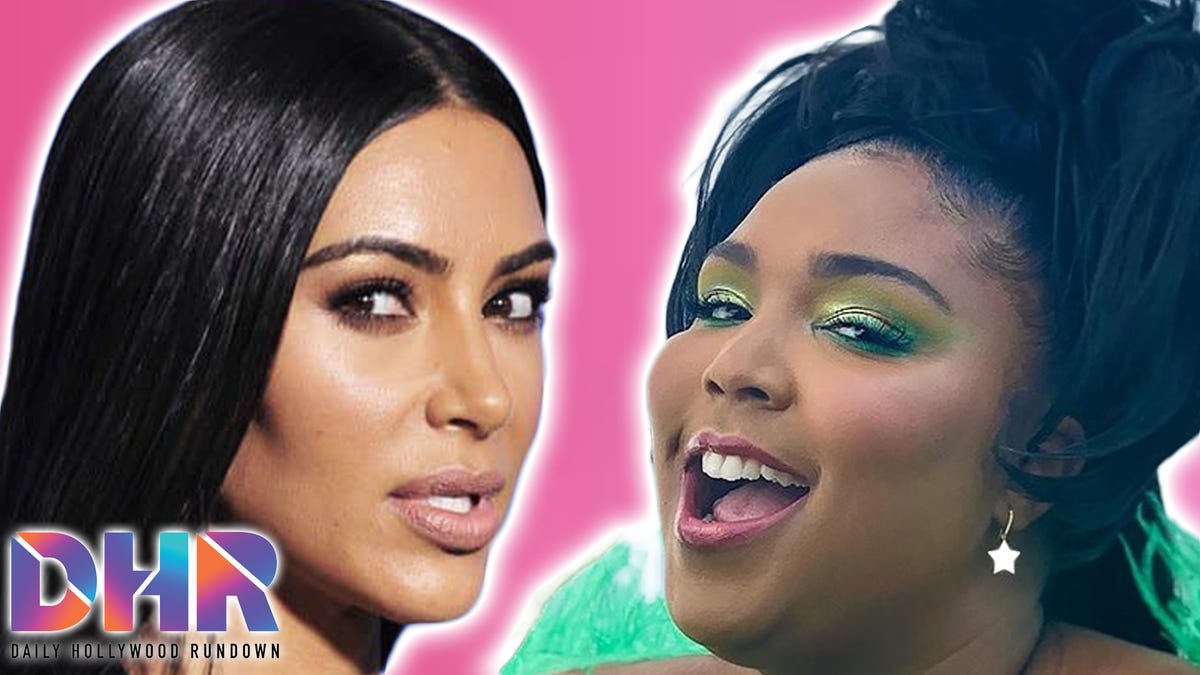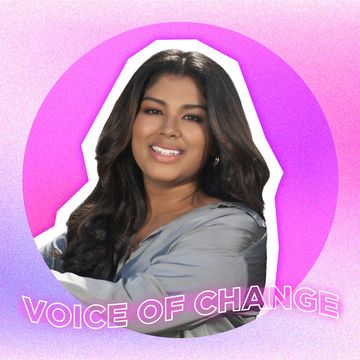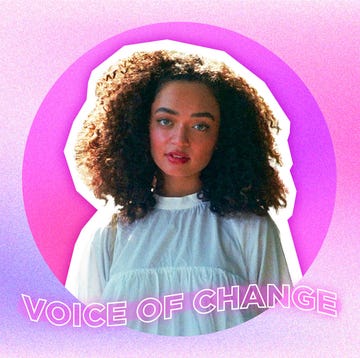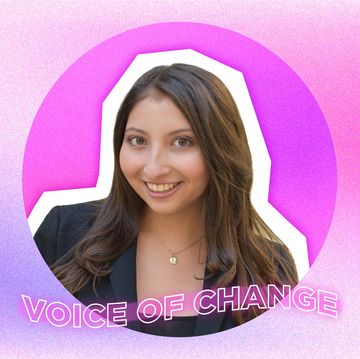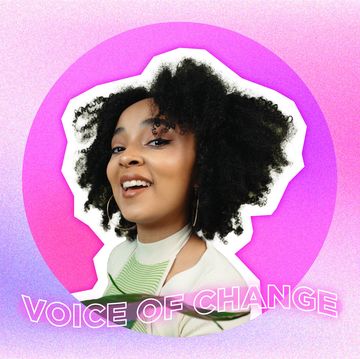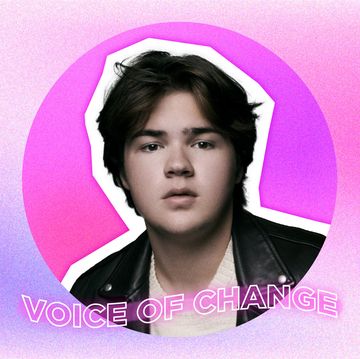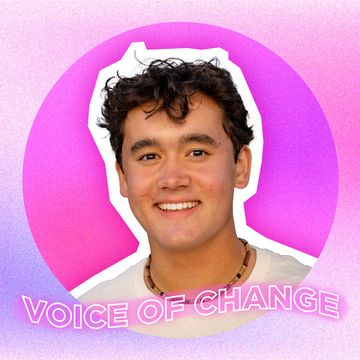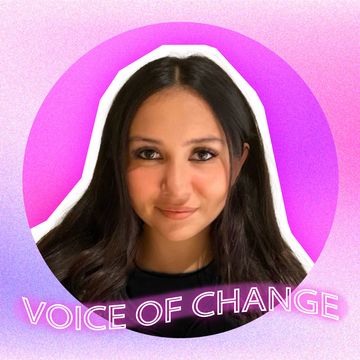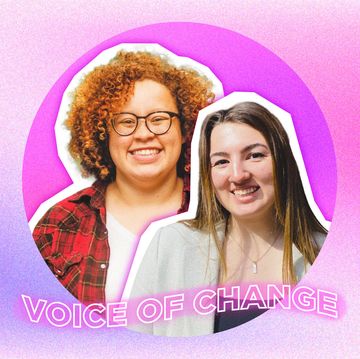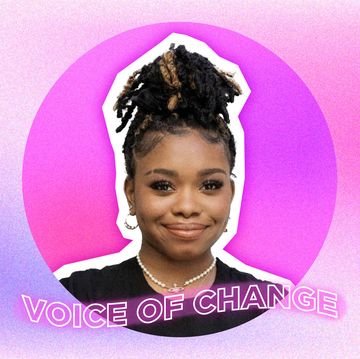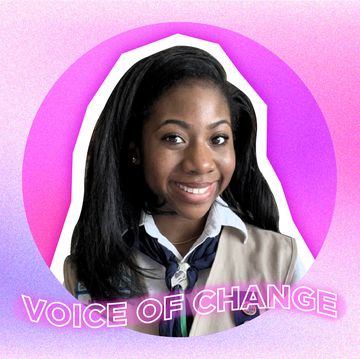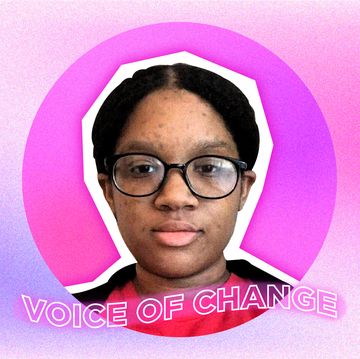Even during the most challenging times in history, it's important to highlight those who are continuing to follow their dreams and are taking strides to make the world a better place. Each month, Seventeen is honoring one young person as a Voice of Change, someone who is making a difference in their community and the world at large.
If Zahra Biabani could sum up her life right now in one phrase, it’d be “chaotic, but fulfilling.” It’s an entirely apropos term to describe the months leading up to and following the 23-year-old’s graduation from Vanderbilt University in December 2021. Since receiving her diploma in environmental studies, Zahra has sustained a thriving social media presence on TikTok and Instagram dedicated to turning climate hope into action, continued plans for her soon-to-launch rental clothing subscription service, and filed a legal complaint against her alma mater for their investment in fossil fuels.
But Zahra’s work in climate advocacy dates back years, when in 2017, the Houston native penned a post about mental wellness on her blog, Soulful Seeds. A classmate shared with Zahra how the piece resonated with her, and as the two talked, the classmate disclosed that she’d been trafficked throughout high school. “I was shocked — I never thought of it as an issue that was present in the U.S., let alone my school,” Zahra told Seventeen. “It opened my eyes to an issue that I didn’t realize the scope of.”
Zahra delved into research about how to combat human trafficking, and while doing so, learned about glaring exploitations in the fashion industry. “My anti-trafficking efforts merged with sustainable fashion because I realized that not only is there an environmental impact of the clothes we wear, there’s a human impact,” she said. The experience sparked a series of efforts over the years that would eventually lead to becoming the CEO and founder of In the Loop, Zahra's rental clothing subscription service with fellow sustainable fashion influencer Megan McSherry.
Along the way, Zahra worked with a social services agency in Houston and saw firsthand the damaging effects of climate change — such as the devastation caused by Hurricane Harvey — on marginalized and low-income communities. She played a major role in Vanderbilt’s campaign for divestment, all the while utilizing social media to discuss climate news and progress. It’s for these many impactful efforts that Zahra Biabani is recognized as a Seventeen Voice of Change.
Tell us about the legal complaint you filed against Vanderbilt University.
Divest Vanderbilt alleged in a legal complaint that by remaining invested in fossil fuels, our university fails to adhere to the Uniform Prudent Management of Institutional Funds Act. This law asserts that a nonprofit must align their investments with their mission statement.
We reached out to divestment organizers at Harvard University, who followed this strategy about two years ago and credit their legal complaint for, at least in part, helping their chancellor commit to divestment. With assistance from the Climate Defense Project (CDP), our team organized a similar complaint against Vanderbilt.
I reached out to our project manager at the CDP, who hinted that the Massachusetts Institute of Technology, Stanford University, Yale University, and Princeton University were also filing complaints with their respective state attorney generals. I organized a Signal group chat and we had meetings with the other schools to talk strategy in terms of filing and gaining media attention. We call our efforts the Fossil Free Five Coalition.
We recognized the immense privilege that we have as students at these highly ranked universities. We wanted to leverage that, plus the connections we had through our schools, to create a robust campaign, and we're hoping this inspires other universities in the U.S. and abroad to take similar legal action. The onus is now on the state attorney generals, but we didn't file this complaint for the sole purpose of expecting divestment across the board — that's the goal, but another purpose was putting more pressure on our universities, which we're continuing to do through shareholder activism.
Your weekly "Earth Wins" series highlight positive progress in environmentalism. What prompted you to create these videos?
I majored in environmental sociology and minored in earth and environmental science. While doing this activism work both online and offline, I found myself prone to burnout and discouraged by the onslaught of negative news presented in media and social media.
I needed a mindset shift to continue this work. I was inspired by a friend on Instagram (Kathryn Kellogg, @going.zero.waste) who shared good news items every Friday. I asked her if I could do a similar series, and since TikTok at this time was blowing up — specifically the dancing videos, and I had a background in dance — I thought I could add dance to hopeful climate news and see if people would like this little burst of joy. It really took off and I realized that our efforts matter. People wanted and needed that encouragement. Not everything is going to be a win, but wins are built off the work of people like myself and so many other impassioned activists who care about making a change.
Tell us about In the Loop, your rental clothing subscription service.
I started my social media account, Soulful Seeds, talking about ethical and sustainable fashion. I thrifted all through college and while I still think it’s one of the best ways to source your clothes in terms of ethicality, I realized that it's not accessible to everyone. I also discovered that a lot of my audience wanted to support sustainable and ethical fashion brands, but just didn't have the means to do so, primarily because of cost and size exclusivity. And I think because a lot of Gen Z can't afford them, these brands cater mostly to older individuals. I saw a big disconnect between the potential demand for these brands and their actual output.
My business partner, Megan McSherry — a sustainable fashion educator and influencer who has an educational background in supply chain management — and I conducted some surveys and decided that a rental clothing subscription service was the best solution.
For sustainable and ethical fashion to displace the hold that ultra-fast fashion companies have, it needs to be more accessible for all. Our goal is to have a platform where we don't need to say “sustainable” and “ethical” in front of every single item because all will abide by a certain set of standards, and customers can trust that we’re taking the steps to reduce our impact. Rental in its nature is carbon-intensive because of shipping so we’re continuously trying to minimize those emissions on all fronts, such as using brands’ model stock or slightly damaged stock that would otherwise be in storage or discarded. It’s been a journey and we don’t launch until June 1, but we're excited to see where it goes.
What standards do you look for when you're vetting brands for In the Loop?
We abide by core values — fair wages, intentionally chosen materials, and future-oriented goals. Brands must provide third-party certifications or documentation that garment workers are paid a living wage. They can also provide information about codes of conduct, benefits, and initiatives of their factories. Brands must also use intentionally chosen materials, which means that more than 50 percent of their materials are low impact or non-virgin — that could be organic cotton that's grown regeneratively or upcycled garments. Finally, brands have to provide us with their short-term and long-term sustainability goals. We understand that no company is perfectly sustainable, but we want to make sure that they’re implementing action now, and have intentions for the future.
What are some of your favorite sustainable brands?
I really like Selva Negra, Shop LOTI, and Hargan Denim. Other than that, I mostly thrift.
What are your go-to tips for thrifting?
Go in with specific pieces or vibes in mind because it can be overwhelming. I keep a list on my notes app, and a Pinterest board of styles that I want to find. This also helps ensure that you're not impulse buying. Secondly, make sure you're thrifting in a conscious way. Keep thrifting accessible for people who need it financially, so don't get items that are high in demand — for instance, jackets and boots in the winter. Be mindful of items that thrift stores usually run out of (you can ask if you’re unsure) and try to find those pieces elsewhere.
Reflecting on everything you've accomplished so far, what are you most proud of?
I'm writing a book right now! It's about climate optimism and unpacks 1) the cognitive biases that make it difficult for us to cultivate a mindset of optimism, especially as it pertains to the climate, 2) trends in the last few decades that give us encouragement for environmental progress, and 3) the stories of environmental movements in the Global South that give us hope for the climate crisis. These are stories of resiliency and innovation that often go unheard. I'm really excited about this book project because for a while I've been wanting to take things offline; I'm so grateful for online platforms, but a lot can get lost in a 30-second video.
What advice would you give to those looking to get involved in climate advocacy or any type of social justice movement?
Start locally. There’s a lower barrier to entry given that there are so many organizations within cities and college campuses. It might be less intimidating to get involved on a local level, and it's so impactful because you're joining a group of impassioned people who believe in what you believe in and are fighting actively. Local policy can make your voice feel heard and you’ll feel like a part of a wave of change.
How have you grown as an activist?
I've grown to be a lot less binary in my thinking. I used to think very black or white — for instance, if someone's not vegan, they don't care about the environment. That thinking even aligned in the policy realm — I wouldn't have thought to reach out to more conservative organizations or activists prior to just a few years ago because I was under the mindset that they don't care as much as we do. This is not only a harmful narrative to spread, it's a harmful belief to hold. It’s also just ineffective. This is such a big crisis, we need everyone all hands on deck. Everyone has a place in the movement — no one can do it all.
What does being a Voice of Change honoree mean to you?
I'm so honored. It means that in a time where it feels like change is futile, I'm part of a generation and a community of people working against that. We're working to push the needle in ways that matter, and we're discrediting the notion that we're too young to make a difference or that our voices can't spark change.
Parts of this interview have been edited and condensed for clarity.
Leah Campano is an Associate Editor at Seventeen, where she covers pop culture, entertainment news, health, and politics. On the weekends, you can probably find her watching marathons of vintage Real Housewives episodes or searching for New York City’s best almond croissants.


